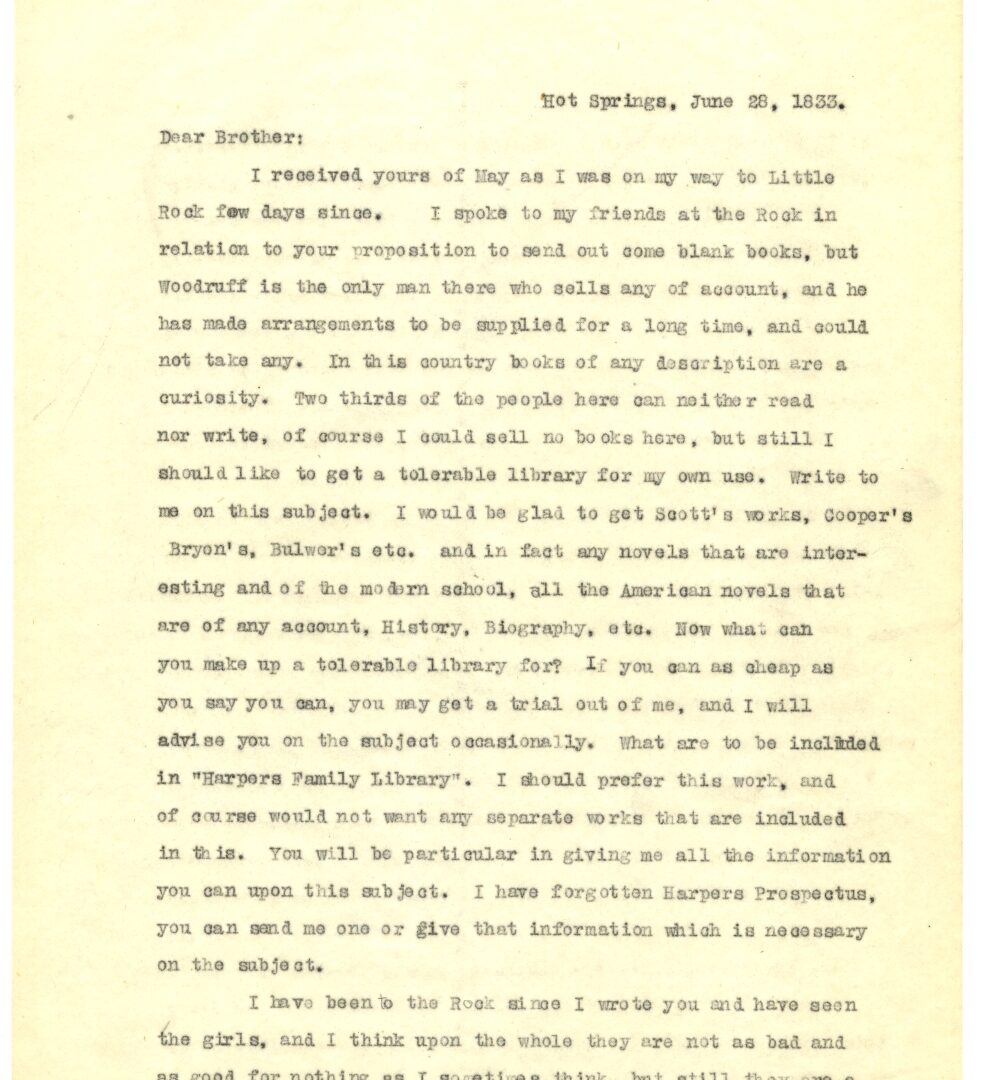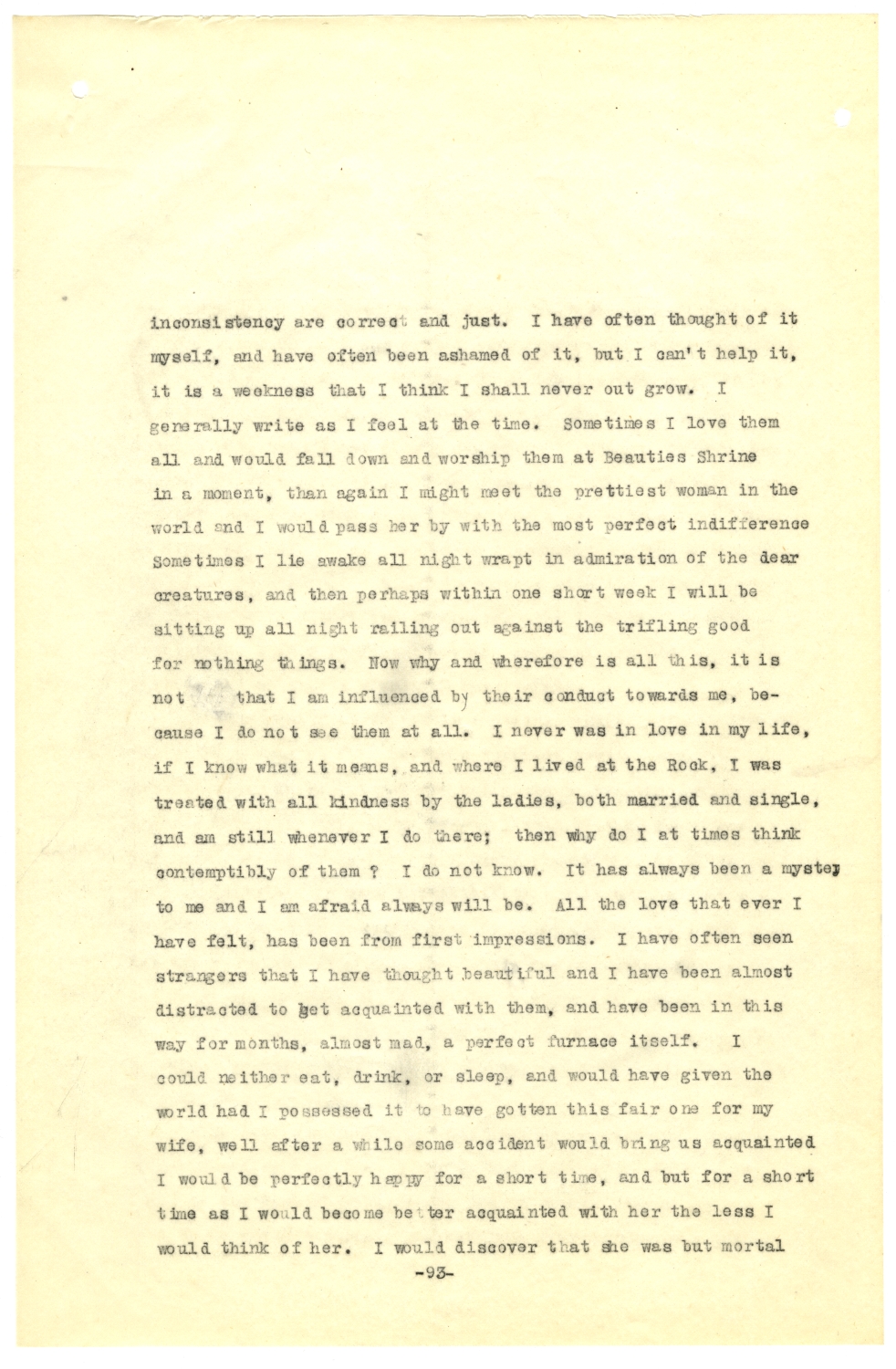Hot Springs, June 28, 1833
Introduction
Hiram Abiff Whittington’s letters, which he wrote to his brother Granville Whittington in the late 1820s and early 1830s, remain one of the most valuable personal accounts of daily life in Arkansas shortly before Arkansas Territory became a state. Whittington was one of many entrepreneurial men who moved to Arkansas seeking exciting opportunities and new life in what was at the time the frontier of the United States. He was born in 1805 in Boston, Massachusetts, and moved to Little Rock in 1826. He was a skilled printer and book binder and had experience in book trade and publishing. In Little Rock, he worked as a printer with the Arkansas Gazette but in 1832 he moved to Hot Springs. He settled there hoping that the spring waters would have a healing effect on his deteriorating health. He opened several businesses, created first lending library in Arkansas, and established a successful political career, eventually serving as a state representative. In 1836, Whittington returned to Boston to marry Mary Burnham. The two moved back to Hot Springs and had six children. Whittington died in 1890 in Hot Springs.
Whittington’s letters provide an account into the daily life in Arkansas Territory from a perspective of a white middle class educated man. Access to Whittington’s original letters, which are housed at the Special Collections Department of the University of Arkansas in Fayetteville, is limited due to the documents’ fragility. To make these rare and extremely valuable records more accessible to researchers, educators, and students, Whittington’s letters were typed. Activities in “Arkansas Before Statehood” are based on six typescript letters (typed copies of the original letters) selected from a collection of sixteen letters housed at the Center for Arkansas History and Culture in Little Rock (Hiram A. Whittington Papers, 1824-1834, UALR.MS.0157).
Note for educators: Each letter and thus each exercise in “Arkansas Before Statehood” can be used as a separate complete activity to enrich a discussion on Arkansas history shortly before statehood. However, each letter highlights different aspects of life in Arkansas Territory so any number and combination of letters and corresponding exercises can form a set. All the six letters showcased in “Arkansas Before Statehood” and thus all the corresponding exercises can be also used as a set to create a more comprehensive and complex historical picture. The latter may work particularly efficiently if you divide your students into groups and assign one letter to each group.
Activity Questions
Hiram Abiff Whittington letter to Granville Whittington, page 93
- Why are books not common or popular in Arkansas according to Whittington? What does this tell us about the people who migrated to Arkansas Territory?
- What does Whittington write about women? Note that Whittington’s thoughts on women do not tell us anything about women. Instead, they tell us a lot about Whittington and his understanding of women. How would you describe Whittington’s personality and character based on this section of the letter?
- Whittington reports a seasonal outbreak of cholera, a serious disease that according to Whittington affected large numbers of people west of the Mississippi river. Research the causes and symptoms of cholera. The disease is not very common in the United States anymore and even in 1833, Whittington writes that he never saw it before moving to Arkansas. Why do you think cholera was such a big threat in places like Arkansas Territory?
- How did cholera affect people according to Whittington? What impact did it have on enslaved African Americans in Arkansas Territory? What does it tell us about slavery in Arkansas?
- Whittington informs his brother that he is running for office and that “our election is approaching rapidly.” The letter suggests that he is confident that he will win. He was correct. In 1833, he was elected clerk of Hot Spring County. Whittington moved to Arkansas in 1827 so only six years before the 1833 election that he won. What does Whittington’s win tell us about politics in Arkansas in the 1830s? Why do you think he was able to convince Hot Spring County voters to support him only six years after moving to Arkansas? At the time, Hot Spring County had the population of around 450. How many people had the right to vote according to Whittington? Research who could and who could not vote in Arkansas in the 1830s.
Additional Questions
These can be applied to any letter or any set of letters used in the Arkansas Before Statehood theme.
- What can we learn about life in Arkansas Territory from Whittington’s letter/letters?
- How did Whittington’s social status and his own experience shape his perception of Arkansas? Whittington was a white middle class educated man from Boston, which was at the time one of the largest cities in the United States.
- How did Whittington’s social status and his own experience shape his life in Arkansas? Did the people who were not white, educated, middle class, or men have the same life in Arkansas in the 1820s and 1830s as Whittington?
- How did Whittington’s social status and his own experience shape his perception of people in Arkansas who were not like him (e.g., women, Native Americans, enslaved African Americans, uneducated poor workers)?
Primary Sources
To learn more about the primary sources featured in the activities above, click the following links:
Arkansas Social Studies Standards
US History, Grade 8
- Strand: Era 4: Expansion and Reform 1801-1861
- Content Standard 1: Students will analyze the period of expansion and reform in the United States.
- Era4.1.8.1 Analyze multiple factors that affected territorial expansion and influenced the perspectives of people
- Era4.1.8.3 Examine economic, political, and geographic causes and effects of territorial expansion
- Era4.1.8.6 Evaluate the historical significance of individuals, groups, and events
Arkansas History, Grades 7 – 8
- Strand: History
- Content Standard 7: Students will examine the impact of historical events and people on the development of Arkansas.
- H.7.AH.7-8.1 Evaluate ways that historical events in Arkansas were shaped by circumstances in time and place
Arkansas History, Grades 9 – 12
- Strand: Era 2: Louisiana Purchase Through Early Statehood 1803-1860
- Content Standard 2: Students will analyze causes and consequences of events from the Louisiana Purchase through early statehood.
- Era2.2.AH.9-12.1 Evaluate intended and unintended consequences of public policies (e.g., Louisiana Purchase, Missouri Compromise, Indian Removal)
- Era2.2.AH.9-12.4 Evaluate effects of human-made and natural disasters on Arkansas (e.g., earthquakes, flooding, disease)
- Era2.2.AH.9-12.5 Evaluate reasons for and impact of human settlement on various regions (e.g., land grants, labor force, railroad, political unrest)
Key Terms
More Information
- https://encyclopediaofarkansas.net/entries/hiram-abiff-whittington-1172/
- https://encyclopediaofarkansas.net/entries/louisiana-purchase-through-early-statehood-1803-through-1860-398/
- https://www.historicarkansas.org/Collections-and-Research/arkansas-history-timeline-1819-1861
- https://www.digitalhistory.uh.edu/active_learning/explorations/indian_removal/removal_timeline.cfm
Downloadable Guides and Handouts
We encourage K-12 educators to use History Alive: Virtually! in a way that will best match their classroom needs. The “Exercise” handout includes a complete exercise as featured on this website, the “Primary Sources” handout includes only primary sources used in the exercise, and the “Questions” handout includes analytical questions from the exercise but is editable and can be easily changed to best match students’ needs.
Hot Springs, June 28, 1833 – Exercises


